In February of 1797, a small French military force landed in Wales. It was farce, easily rolled up by the British defenders. Participating in an invasion based on this one – either as an invader or a defender – is a surprisingly interesting RPG adventure hook! One of the weird events that followed the invasion also makes a cool hook. In the paranoia that came after the invasion (what if the French were going to try again?) two of the greatest figures in English poetry, William Wordsworth and Samuel Taylor Coleridge, were accused of being French spies. They weren’t, but it’s a great story and a template for an unusual sort of RPG mini-adventure.
This post is brought to you by beloved Patreon backer Justin Moor. Thanks for helping keep the lights on! If you want to help keep this blog going alongside Justin, head over to the Patreon page – and thank you!
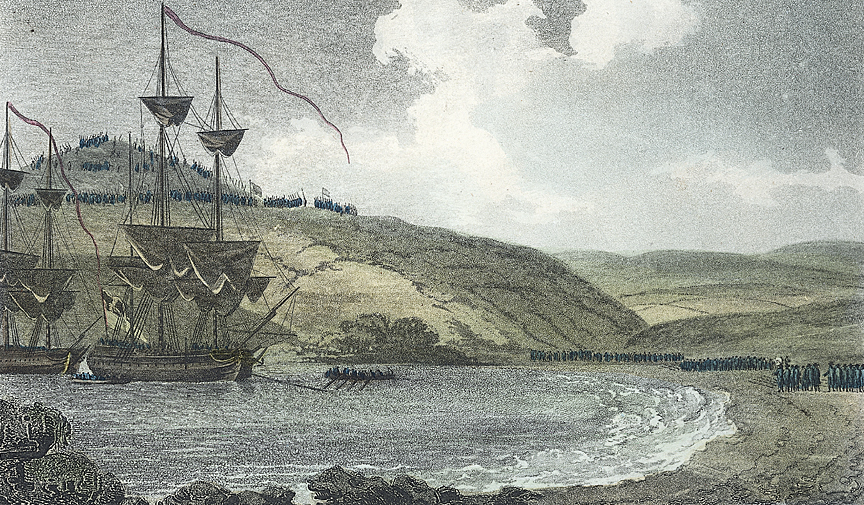
The Fishguard Invasion of 1797 wasn’t supposed to be such a joke. It was supposed to be a distraction for a major French invasion of Ireland. France and Britain had been at war since 1793. The British rule of Ireland, already famously oppressive, grew harsher still under the exigencies of war. The Irish revolutionary Wolfe Tone convinced the French government that Ireland was ready to revolt. It only needed to be instigated and, if the revolt were to succeed, a little French assistance. In December of 1796, a French army set sail for Bantry Bay with Tone aboard. But terrible weather kept the soldiers from landing and drove the ships from the bay. A dozen French ships sank out at sea and thousands died. Had they landed, they’d have found the Irish ready to revolt and the English not ready to respond. The Napoleonic Wars might have gone very differently.
Two other, smaller, invasions were supposed to happen at about the same time. If the British responded to these invasions in force, they’d be useful diversions for the main effort. If the British instead focused on Ireland, these smaller forces might be able to do some real damage. One was aimed at Newcastle, the other at Bristol. Bad weather stopped the Newcastle expedition before it began, but the one aimed at Bristol still went ahead in February of 1797 for reasons I was not able to determine. Tides and weather kept them from Bristol, and instead they landed near the village of Fishguard in Wales.
The invading commander had his work cut out for him. Colonel William Tate wasn’t French but an Irish-American veteran of the American Revolution. His family had been murdered by pro-British forces during the Revolution. He joined the French army as an opportunity to kill more Englishmen as revenge. But half of Tate’s soldiers were convicts pressed into service. As soon as their feet touched sand, they deserted and started looting farmhouses. Twelve of these were captured by local heroine Jemima Nicholas, an enormous shoemaker who captured them with her pitchfork, marched them to the local church, and earned herself a sizable government pension.
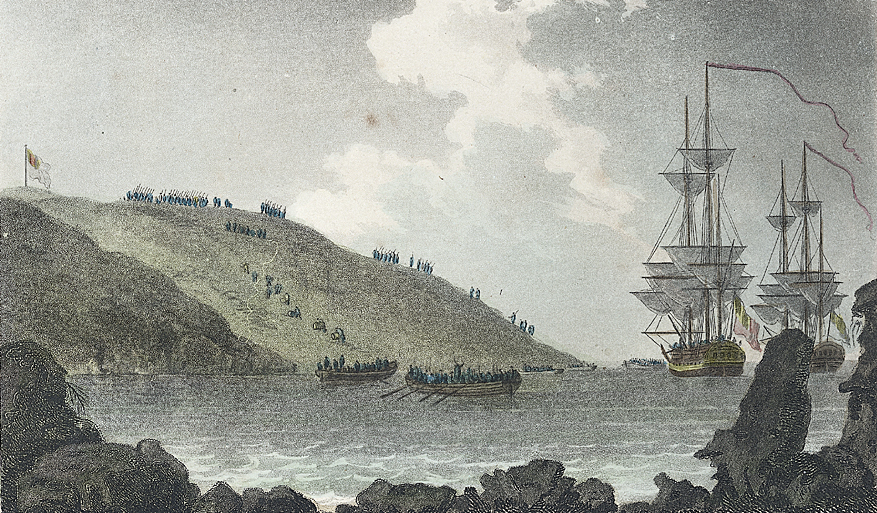
The Welsh defenders were commanded by the art collector and abolitionist Member of Parliament John Campbell, First Baron Cawdor, Governor of Milford Haven. Lord Cawdor was a gambler too; one story has him first hearing of the invasion in the middle of a card game. Fishguard being the middle of nowhere, Cawdor had no regular soldiers to command. Instead he quickly (albeit chaotically) summoned five hundred members of the local citizen-soldier unit. Other volunteers swarmed to him armed with rakes, spades, and old muskets. Lord Cawdor set up his command post at an inn.
Colonel Tate, the French commander, didn’t like his chances. He was on an unfamiliar shore, half his troops had deserted, and the whole countryside seemed to be rising against him. With his 600 remaining regular troops, he might have been able to defeat Lord Cawdor’s 500 citizen soldiers – but Tate had no way to know that. He walked to Cawdor’s inn command post and asked if they could negotiate. But Lord Cawdor was a gambler. He understood the value of a bluff. He assured Tate that the British had a vastly superior force. Cawdor would annihilate Tate’s invaders unless Tate surrendered unconditionally on the beach tomorrow morning.
Tate wasn’t sure what to do, but he kept his options open. He assembled his troops on the beach at first light. On the cliffs overlooking the sands, the whole population of Fishguard came out to gawk. Hundreds of women were wearing red flannel shawls against the cold. Tate took the red shawls to be red British uniforms – he couldn’t tell otherwise at that distance – and concluded he was hopelessly outnumbered. He surrendered. Thus ended the last invasion to reach Great Britain – though maybe the future holds additional invasions still more farcical
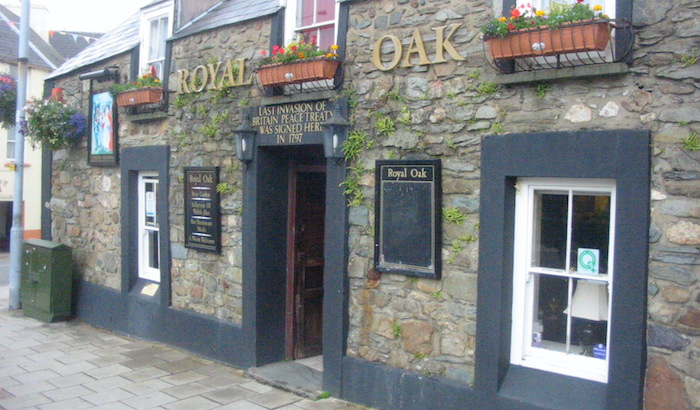
Image credit: Donar Reiskoffer, released under a CC BY 3.0 license.
I’ve got a long-running series here on the Molten Sulfur Blog: PCs on the Battlefield. This is the eleventh entry in that series. Its thesis is that you gotta be careful with how you handle battles at the table. Wars and battles can make good RPG adventures (stuff that’s awful in real life makes compelling stories), but most RPG combat isn’t interesting at the mass scale. What you want to do instead is to zoom in on a little part of a battle: a small engagement, with only a few people on each side, but one with an outsized impact on the battle as a whole. That way you can keep the combat at the scale where most RPGs excel, but still make the whole battle hinge on the actions of the party.
If you file the serial numbers off it and drop it into your fictional setting, the Fishguard invasion would make a great battle for the PCs. If the party is on the side of the invasion, a little bit of better intelligence or scouting might have convinced Colonel Tate to go on the offensive. If he’d taken 600 regulars and struck while Lord Cawdor was still getting organized, the invasion might have gone very differently. Scouting and spying out the enemy are exactly the sort of small-unit actions that are fun at the RPG table. Throw an ambush or two at the party, and if the PCs survive, let them observe that your Cawdor-analogue has no sizable gathering of troops at his command – and that all the women are wearing red flannel shawls for some reason.
If the party is on the side of the defenders, model their adventure on that enjoyed by our hero of the people, the giant cobbler Jemima Nicholas. Enemy deserters are looting the area. Can the PCs capture them or scare them off?
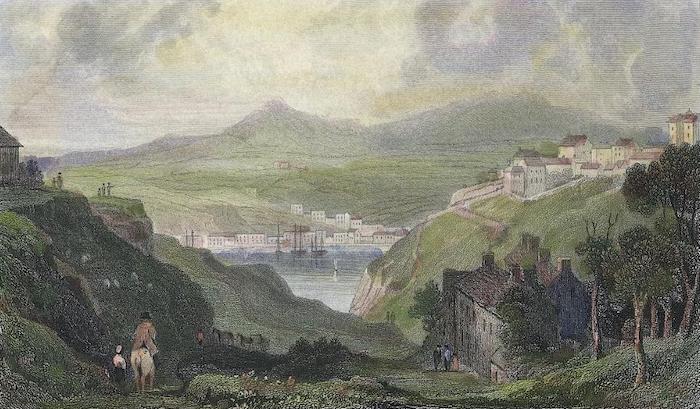
The invasion was dumb, but a lot of Britons were really scared by what it suggested. Ireland really did revolt next year, with limited French backing. And the ‘wooden wall’ of the Royal Navy really didn’t guarantee the French couldn’t land on British shores. There would be further invasion scares in 1798 and 1804. Fears of invasion intensified fears of foreigners and strangers. Anyone you didn’t know could – just maybe – be a French spy looking for good landing sites. This brings us to our next little story.
William Wordsworth and Samuel Taylor Coleridge were poets and friends who helped launch the Romantic movement in English literature. Capital-‘R’ Romanticism isn’t about romance per se, but is instead about nature and strong emotions. The movement touched every corner of the arts and the humanities, and Wordsworth and Coleridge are two of its biggest representatives in the English language. I tend to like Coleridge better than Wordsworth (his Rime of the Ancient Mariner is spooky and wild!) but Wordsworth was arguably more appreciated in his own lifetime.
In the summer of 1797, Wordsworth and Coleridge rented homes near English the coast in Somerset. They were 27 and 25 years old. They were enjoying the local scenery. Coleridge was working on a poem called ‘The Brook’. The two asked the locals a lot of questions that made sense if you were young poets fascinated by nature (“Hey, is that river navigable?”) but were weird by any other measure – the sorts of questions French spies might ask. Folks began to gossip. The gossip spread inland, eventually reaching the cook of a doctor in Bath. She told the doctor, who wrote to the Home Office, who dispatched an agent named James Walsh to investigate.
In a few weeks of watching Wordsworth and Coleridge, Walsh determined the two must surely be spies. He confirmed they were asking suspicious questions. One of their visiting friends was a disaffected radical. And they knew they were being watched! Agent Walsh had a big nose, and he reported that Wordsworth and Coleridge talked a lot about one ‘Spy Nosey’, who must surely be the agent. In truth, ‘Spy Nosey’ was a garbled mishearing of ‘Spinoza’, the 17th-century Dutch philosopher whom the poets were reading. Wordsworth and Coleridge weren’t arrested, but their landlords made it clear their leases wouldn’t be renewed.
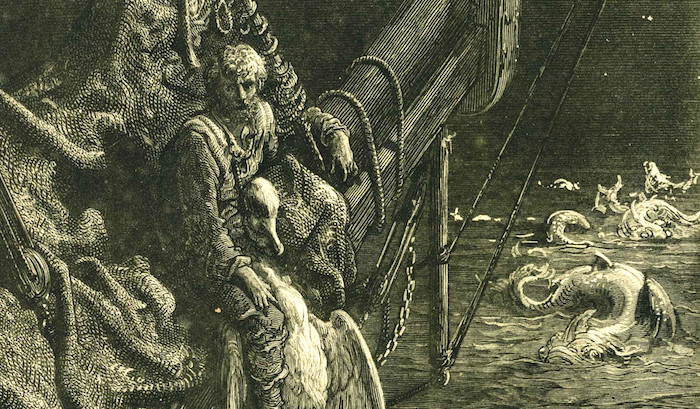
Normally, I’m staunchly opposed to GMs including red herrings in their investigation adventures. Players don’t need any help coming up with red herrings. They do that just fine on their own. Any GM who’s been around the block a few times can tell you horror stories of players latching on to some inconsequential detail that they’ve decided is the center of the entire mystery. Just worry about including the relevant clues, and leave the red herrings up to the players.
But this ‘Spy Nosey’ business gives us a different sort of red herring – one where the entire adventure is a red herring, from top to bottom. I must confess, I’ve never run an adventure where the PCs investigate a crime that never occurred in the first place. But this ‘Spy Nosey’ business sure makes me want to. I know some of my players read this blog – friends, you’ve been warned.
If the PCs are put in the shoes of the incompetent government agent James Walsh, first come up with a crime that never happened and a couple of colorful NPCs who allegedly committed it. Poets born into money are convenient, because they exist outside the conventions of their comfortable society. Just breaking those norms makes them suspicious. Then come up with a couple of very sensible things for these NPCs to be up to and figure out what makes these acts suspicious. If you’re lucky, the players will grow convinced that their targets are masterminds, and every innocent answer is a cunning coverup. In the real world, cops, prosecutors, and intelligence officers get hung up on these details all the time and accuse innocent people. It’s a useful exercise in intellectual humility to put your players through the same experience – as long as you don’t force it, but let your players wild-goose themselves.
I stumbled on Fishguard and Spy Nosey in the process of doing background research for Ballad Hunters, my upcoming TTRPG about singing and fighting magical folk ballads in 1813 England and Scotland. The early-access version of the game is free! Check it out!
Progress on Ballad Hunters is going great. Background research on the setting is mostly done. So too is the musical side of the game: which ballads to include (out of the thousands I reviewed) and the player options (the ‘compass verses’). The rules set is largely unchanged from Shanty Hunters, but I’m hoping a few people will send me recordings of them playing the early-access version, which will be enormously helpful in adjusting the rules to fit this new context. If that happens (a big ‘if’!) the big hump remaining for me is playtesting the adventure design.
Ballad Hunters has an unusual conceit: you sing a song at the table with your friends, and the lyrics of the song wind up being the adventure you play through; parsing the lyrics to anticipate trouble and solve problems fills the same role as parsing clues in a murder mystery. That means the adventures are weird. And that means I can’t assume that GMs can rely on their experience preparing adventures in other systems. I’ve got to make sure I, the author, really understand what makes a Ballad Hunters adventure sing (pun intended). And then I’ve got to include that understanding in the book, in the form of GM advice that isn’t really advice, but is rather a sort of soft rules set: make sure you build your adventures like this if you want them to be fun. Ballad Hunters is going to include all the pre-prepared adventure material you could ever want, but lots of GMs, myself included, prefer to prepare their own stuff. And I’ve got to make sure those folks are just as well-supported as the folks who want to run something right out of the box.
So I’ve got to run a lot Ballad Hunters. I’m running it at Gen Con. The scheduled events have sold out, but if you’re going to be at Gen Con and want me to run a special session for you and your friends, or for you and other people who hit me up, let me know. I love gaming with my readers! And I’m running Ballad Hunters at local conventions, with my regular gaming group, and with anybody who wants it. If you want to hit me up, use the contact form.
Game on!
–
Source: In These Times: Living in Britain Through Napoleon’s Wars, 1793-1815 by Jenny Uglow (2014)







